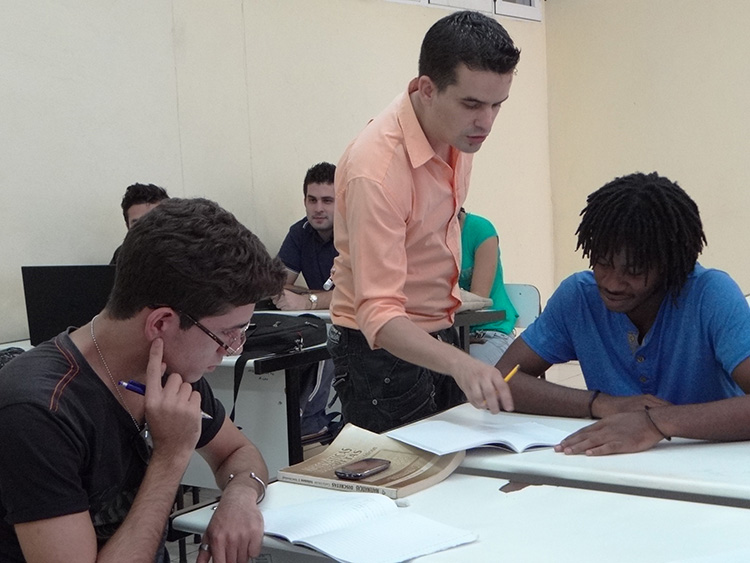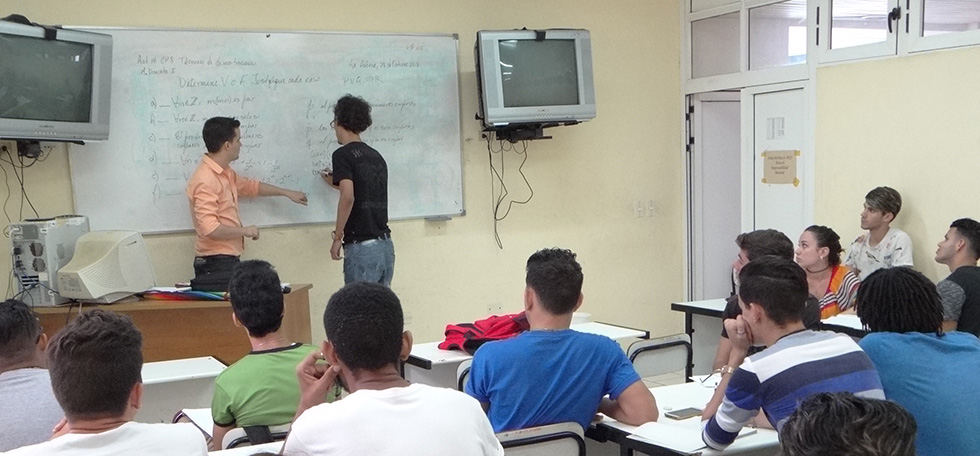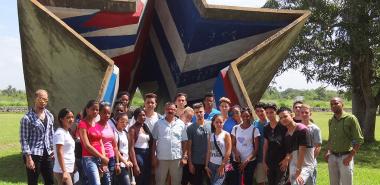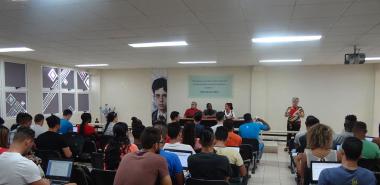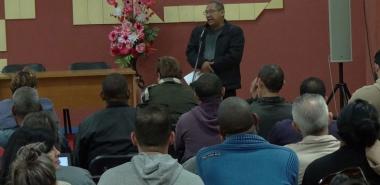MSc. Alién García Hernández, teaching Discrete Mathematics at Introductory school, with just graduate professors present. Photo: Alberto Medina Cruz
To prepare new professors , the task of the most experienced
The University of Informatics Sciences (known as UCI), like all Cuban higher education centers, nurtures each year its staff of young graduates of different careers throughout the country, who face for the first time the beautiful but complicated task of teaching.
To know a little about the treatment of the Graduates in Training who teach classes in the university, we approach the Introductory Faculty of Computer Science (FICI) and talk to the MSc. Alién García Hernández, head of the subject of Discrete Mathematics at the University.
García Hernández commented to Mella Newspaper, which at the beginning of the semester at the FICI, received eight professors who had never taught the subject and had seven who did once.
As a result of this, we set ourselves the task of knowing how the staff of this subject is organized specifically since the preparation and effectiveness of the classes of these new professors is a priority of the most experienced.
"It is a staff, for the most part, with deficiencies in its preparation, so the Faculty organized it in such a way that more experienced professors give lectures and less experienced practical classes, but always under the guidance and supervision of the Lecturer, to this small team of teachers we call the Pedagogical Working Group (GTP).
"It should be noted that FICI has 40 teaching groups divided into five blocks, each associated with the remaining faculties of the University. The Pedagogical Working Groups allow us to better organize the methodological preparation of all teachers ".
- How is it possible to prepare methodologically a staff so heterogeneous?
- We have many teachers without experience, our duty is to enlist them. Weekly we make the methodological preparations, first at the central level where we analyze core topics of the subject, especially in regard to the content category, and then each GTP, led by the lecture teacher, analyzes the practical classes to be taught, that is the most important space, because the exercises to be done are discussed and the less experienced teachers are fed directly not only what to teach but how to impart it.
- We also understand that you are teaching public classes, can you explain what they are.
- Yes, the public classes began to be taught and we will have them in two ways. In a first variant, there are the demonstrative classes, where the most experienced teachers teach a practical class to a group of students in a public way so that it is observed by the other teachers and then discuss the main results of that activity. In a second variant we will soon experience, in the space of Methodological Preparation, the fact that a teacher exposes the exercises of his practical class to be debated by all, in that debate we will analyze possible ways of solutions, perhaps propose new exercises , and promote interdisciplinarity with other subjects and exemplify variants for better understanding of the students.
- Do you think that having such a young staff do not affect the teaching performance of the students, or do you see it as an advantage?
- The teaching results of the students contribute several variables, one of them is the attitude to the study of the students themselves, another our classes as teachers. I can tell you that although our staff is young, it is a committed staff , wanting to excel. We are giving you a postgraduate course on Discrete Mathematics Complements. A group of actions have been carried out to enhance students' learning, among them we can highlight the opening of the Discrete Mathematics virtual course in the ZERA platform and the creation of various educational materials, which enables the student to have access to information commonly , beyond the one given by its teachers individually.
The actions of the group of Discrete Mathematics are examples of commitment in the learning of the students and with the overcoming of the less experienced teachers.
In this way the teaching-learning process in the University will continue to form Computer Science Engineers committed and prepared to assume the computerization of society.
